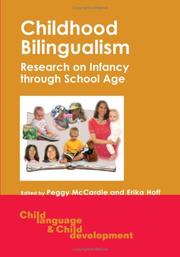| Listing 1 - 3 of 3 |
Sort by
|

ISBN: 9781853598708 9781853598715 1853598704 9781853598692 1853598690 1853598712 1280501790 9786610501793 Year: 2006 Publisher: Clevedon Multilingual Matters
Abstract | Keywords | Export | Availability | Bookmark
 Loading...
Loading...Choose an application
- Reference Manager
- EndNote
- RefWorks (Direct export to RefWorks)
This book contains reports of research on bilingualism in infants and children as well as perspectives from those involved in cross-linguistic research on language development, literacy development in bilingual children, and psycholinguistic research on bilingualism in adults. It offers a fresh multidisciplinary perspective and next steps for research on childhood bilingualism.
Bilingualism in children. --- Language acquisition. --- Literacy. --- #KVHB:Tweetaligheid --- #KVHB:Taalontwikkeling --- Bilingualism in children --- Language acquisition --- Literacy --- Language Arts --- Age Groups --- Child Development --- Persons --- Language --- Human Development --- Named Groups --- Communication --- Behavior and Behavior Mechanisms --- Information Science --- Psychiatry and Psychology --- Multilingualism --- Infant --- Language Development --- Child --- Languages & Literatures --- Philology & Linguistics --- Illiteracy --- Acquisition of language --- Developmental linguistics --- Developmental psycholinguistics --- Language and languages --- Language development in children --- Psycholinguistics, Developmental --- Acquisition --- Education --- General education --- Interpersonal communication in children --- Psycholinguistics --- Children --- Bilingual development. --- Bilingual first language acquisition. --- Bilingual speech processing. --- Biliteracy. --- Child language development. --- Childhood bilingualism. --- Early speech perception. --- English-language learners.
Book
Year: 2021 Publisher: Basel, Switzerland MDPI - Multidisciplinary Digital Publishing Institute
Abstract | Keywords | Export | Availability | Bookmark
 Loading...
Loading...Choose an application
- Reference Manager
- EndNote
- RefWorks (Direct export to RefWorks)
Studies in the fields of bilingualism and second language acquisition have shown that both cognitive and affective psychological factors can influence individuals’ bilingual speech production. More recently, both experimental and variationist studies of bilingual communities have examined the role of social factors on bilinguals’ speech, particularly in cases of long-term language contact and minority-language bilingualism. The Special Issue brings together work on the psychological and/or social factors that influence bilingual speech production as well as work that uses different methodological frameworks. We examine the role of such factors on bilingual speech production in diverse contexts, in order to provide a more holistic account of the ways in which extra-linguistic influences may affect bilinguals’ speech in one or both of their languages.
new speakers --- accent identification --- sociolinguistic awareness --- bilingual speech processing --- Galician phonetics --- minority languages --- first language attrition --- second language acquisition --- sequential bilingualism --- voice onset time --- vowel formants --- speech development --- English --- (Austrian) German --- phonetics --- maternal acculturation --- maternal enculturation --- speech sound production --- Spanish-English bilingual preschoolers --- speech production --- accent --- pronunciation --- minority language bilingualism --- global foreign accent --- accent rating --- heritage language --- majority language --- preschool children --- school children --- Russian --- German --- language variation --- bilingualism --- phonological transfer --- Welsh --- Welsh English --- VOT --- Portuguese --- L1 attrition --- speech --- code-switching --- Austrian German --- phonetic drift --- apocope --- vowel centralization --- vowel reduction --- variationist sociolinguistics --- Calabrese --- Italian --- length of residence --- foreign domestic helper --- foreign accent --- naturalistic adult acquisition --- L2 speech performance --- n/a
Book
Year: 2021 Publisher: Basel, Switzerland MDPI - Multidisciplinary Digital Publishing Institute
Abstract | Keywords | Export | Availability | Bookmark
 Loading...
Loading...Choose an application
- Reference Manager
- EndNote
- RefWorks (Direct export to RefWorks)
Studies in the fields of bilingualism and second language acquisition have shown that both cognitive and affective psychological factors can influence individuals’ bilingual speech production. More recently, both experimental and variationist studies of bilingual communities have examined the role of social factors on bilinguals’ speech, particularly in cases of long-term language contact and minority-language bilingualism. The Special Issue brings together work on the psychological and/or social factors that influence bilingual speech production as well as work that uses different methodological frameworks. We examine the role of such factors on bilingual speech production in diverse contexts, in order to provide a more holistic account of the ways in which extra-linguistic influences may affect bilinguals’ speech in one or both of their languages.
Language --- new speakers --- accent identification --- sociolinguistic awareness --- bilingual speech processing --- Galician phonetics --- minority languages --- first language attrition --- second language acquisition --- sequential bilingualism --- voice onset time --- vowel formants --- speech development --- English --- (Austrian) German --- phonetics --- maternal acculturation --- maternal enculturation --- speech sound production --- Spanish-English bilingual preschoolers --- speech production --- accent --- pronunciation --- minority language bilingualism --- global foreign accent --- accent rating --- heritage language --- majority language --- preschool children --- school children --- Russian --- German --- language variation --- bilingualism --- phonological transfer --- Welsh --- Welsh English --- VOT --- Portuguese --- L1 attrition --- speech --- code-switching --- Austrian German --- phonetic drift --- apocope --- vowel centralization --- vowel reduction --- variationist sociolinguistics --- Calabrese --- Italian --- length of residence --- foreign domestic helper --- foreign accent --- naturalistic adult acquisition --- L2 speech performance
| Listing 1 - 3 of 3 |
Sort by
|

 Search
Search Feedback
Feedback About UniCat
About UniCat  Help
Help News
News